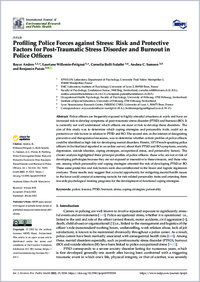Profiling Police Forces against Stress: Risk and Protective Factors for Post-Traumatic Stress Disorder and Burnout in Police Officers
IPC
- Anders, Royce ORCID EPSYLON Laboratory, Department of Psychology, University Paul Valéry Montpellier 3, F34000 Montpellier, France / EMC Laboratory, Institute of Psychology, University of Lyon 2, F69500 Bron, France
- Willemin-Petignat, Lauriane Faculty of Psychology, Unidistance Suisse, 3900 Brig, Switzerland
- Rolli Salathé, Cornelia ORCID Faculty of Psychology, Unidistance Suisse, 3900 Brig, Switzerland / Occupational Health Psychology, Faculty of Psychology, University of Fribourg, 1700 Fribourg, Switzerland
- Samson, Andrea C. ORCID Faculty of Psychology, Unidistance Suisse, 3900 Brig, Switzerland / Institute of Special Education, University of Fribourg, 1700 Fribourg, Switzerland
- Putois, Benjamin ORCID Faculty of Psychology, Unidistance Suisse, 3900 Brig, Switzerland / Lyon Neuroscience Research Center, INSERM, CNRS, University of Lyon 1, F69675 Bron, France
- 28.07.2022
Published in:
- International Journal of Environmental Research and Public Health. - MDPI AG. - 2022, vol. 19, no. 15, p. 9218
English
Police officers are frequently exposed to highly stressful situations at work and have an increased risk to develop symptoms of post-traumatic stress disorder (PTSD) and burnout (BO). It is currently not well understood which officers are most at risk to develop these disorders. The aim of this study was to determine which coping strategies and personality traits could act as protective or risk factors in relation to PTSD and BO. The second aim, in the interest of designating preventive and therapeutical measures, was to determine whether certain profiles of police officers could be identified as high risk for developing mental disorders. Herein, 1073 French-speaking police officers in Switzerland reported in an online survey about their PTSD and BO symptoms, anxiety, depression, suicide ideation, coping strategies, occupational stress, and personality factors. The cluster analysis highlighted three principal profiles of police officers: those who are not at risk of developing pathologies because they are not exposed or insensitive to these stressors, and those who are, among which personality and coping strategies oriented the risk of developing PTSD or BO. These same protective and risk factors were also corroborated in the linear and logistic regression analyses. These results may suggest that a crucial opportunity for mitigating mental health issues in the force could consist of screening recruits for risk-related personality traits and orienting them towards psychological training programs for the development of functional coping strategies.
- Faculty
- Faculté des lettres et des sciences humaines
- Department
- Département de Pédagogie spécialisée
- Language
-
- English
- Classification
- Psychology
- License
- Open access status
- gold
- Identifiers
-
- DOI 10.3390/ijerph19159218
- ISSN 1660-4601
- Persistent URL
- https://folia.unifr.ch/unifr/documents/321076
Statistics
Document views: 156
File downloads:
- andersetal.2022_1: 207
